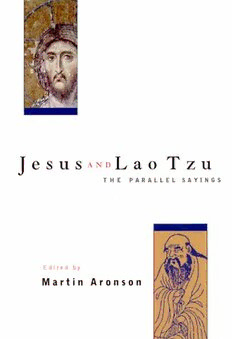Table Of ContentJ e s u s L a o T z u
A N D
T H E PA RA L L E L S AY I N G S
J e s u s L a o T z u
A N D
T H E PA R A L L E L S AY I N G S
with Commentaries
EDITOR
Martin Aronson
INTRODUCTION
David Steindl-Rast
S
eastone
,
Copyright©2003MartinAronson.PrefaceCopyright©2003UlyssesPress.Allrights
reservedunderInternationalandPan-AmericanCopyrightConventions,includingtherightto
reproducethisbookorportionsthereofinanyformwhatsoever,exceptforusebyareviewer
inconnectionwithareview.
FirstUlyssesPressEdition2000
Publishedby:
Seastone,animprintofUlyssesPress
P.O.Box3440
Berkeley,CA94703
www.ulyssespress.com
ChristianscripturequotationscontainedhereinarefromtheNewRevisedStandardVersion
Bible,copyright©1989bytheDivisionofChristianEducationoftheNationalCouncilof
theChurchesofChristintheUSA,orfromtheRevisedStandardVersionoftheBible,
copyright1946,1952,and1971bytheDivisionofChristianEducationoftheNational
CounciloftheChurchesofChristintheUSA.Usedbypermission.Allrightsreserved.
TaoistquotationsarefromTheWisdomofLaotse,translatedandeditedbyLinYutang;Random
House,1948;usedbypermissionofthepublisher;andfromLaoTsu:TaoTeChing,translated
byGia-FuFengandJaneEnglish;VintageBooks,1972;usedbypermissionofthepublisher.
LibraryofCongressCataloging-in-PublicationData
JesusandLaoTzu:theparallelsayings/editor,MartinAronson;introduction,
DavidSteindl-Rast
p.cm.
ISBN1-56975-224-9(paper:alk.paper)
1.JesusChrist--Teachings. 2.Lao-tzu.Taoteching. 3.TaoismSacredbooks--
Quotations. I.Aronson,Martin,1953-
BS2415.A3J472000
232.9’54--dc21 00-064902
CIP
ISBN13:978-1-56975-319-4(paperback)
PrintedinCanadabyTranscontinentalPrinting
10 9 8 7 6 5 4 3 2 1
Editorialandproduction:StevenSchwartz,MarinVanYoung,LynetteUbois
Design:LeslieHenriquesandBigFish
Coverart:DeesisChristwithSt.JohntheBaptist(detail),HagiaSophia,Istanbul,Turkey/Bridgeman
ArtLibrary;LaoTse,2ndofthe“ThreePureOnes,”Marburg,Germany,FotoMarburg/ArtResource,
NY
DistributedintheUnitedStatesbyPublishersGroupWestandinCanadabyRaincoast
Books
C O N T E N T S
Preface vii
Editor’s Introduction xiii
Simplicity 3
Materialism 37
Humility 53
Love 73
Hypocrisy 97
Violence 111
Wisdom 123
Mysticism 153
Immortality 175
Commentaries 191
Bibliography 211
P R E F A C E
byBrotherDavidSteindl-Rast,O.S.B.
Thesnow-cappedpeaksneartheSt.GotthardPassinSwitzerland
aretheheadwaterregionof bothRhineandRhone.Here,highup
in the Swiss Alps, these twin rivers gush forth less than twenty
miles apart. One will flow north, one south, till the whole width
of Europe lies between their mouths. Could a French child
splashingaboutintheMediterraneanatthemouthof theRhone
and a Dutch child wading in the North Sea by the mouth of the
Rhine ever surmise their connection? Thousands of miles apart
they are dipping into the same waters, waters that flow from
mountainpeaksthatneitherof themhaseverseen.
The two rivers from which Martin Aronson has scooped up
theparallelsayingsinthisbookarenotatallparallelrivers.Taoist
traditionandChristiantraditiondonotrunparallel;theyaremore
divergent still than Rhine and Rhone. The vastly different land-
scapes they flow through have less in common than Geneva and
Constance,LyonsandStrasbourg,AvignonandCologne.Thedis-
tinctculturalandlinguisticlandscapesalongtheembankmentsof
our two traditions are mirrored in their waters and make the two
v i i
onthesurfaceutterlydissimilar.Theseimportantandyetsuperfi-
cial differences make the deep similarities between them all the
more striking. Taoist and Christian waters flow down from the
samemountainsandhavetheirorigininthesameeternalsnows.
Whatshallwecallthathiddensourcewhosetastewecandis-
cerninthesayingspresentedinthisbook?Maybewecouldcallit
Common Sense. Unfortunately, this fine term has fallen on hard
times.Tomostpeopleitsuggestsnomorethansweetreason,level-
headedness, or horse sense. But Common Sense deserves to be
restored to its full meaning. It points toward that mystical well-
spring of spiritual aliveness which is common to all humans and
whichalonecanmakeusseesense.Weneedatermtoexpressjust
this notion in contemporary English. Having a name for it might
helpusappreciatewhatthenameexpresses.Appreciation,inturn,
willhelpuslivebyCommonSense.
Ithashappenedbeforethataneverydayterm,worthnomore
than a pebble, was picked up, polished, and given the setting of a
jewel. Heraclitus did this with the word Logos, which before him
meant no more than “thought,” or “word.” Lao Tzu’s term, Tao,
meant no more than “road,”or “way,”until he made it stand for
the same mysterious wellspring that Logos attempted to name.
Logos andTao are not words that belong to our living language,
butif weknowwhattheywanttoconveywewillfinditthere,close
tohome,inthedeepestmeaningof ourowntermCommonSense.
“Nothing is less common than Common Sense,” the early-
20th-century English writer G. K. Chesterton quipped. He was
v i i i
partially right: not that we don’t all have Common Sense, but we
donotcommonlylivebyit.That’swhyourlivesdon’tmakesense.
AndthisispreciselywhatbothLaoTzuandJesuspointouttous.
Neitherof themdeclareswithgreatfanfaretruthsthatnoonehas
ever heard before. On the contrary, “Who of you doesn’t know
this?”theyaskteasingly.Andwhenwehavetoadmit,“Well,every-
oneknowsthis,”theylaugh:“Thenwhydon’tyouliveaccordingly?”
We have fallen into their trap. It was a joke, albeit a serious one,
andweareinvitedtohaveagoodlaughatourselves.
The parables of Jesus, his typical form of teaching, are jokes
of this kind. The joke is on us (all the more so the less we are
aware of it). “Who of you doesn’t know this already?”Jesus asks
time and again.Who of you doesn’t know who your neighbor is
when you are in trouble? Of course, anyone who comes along
should act neighborly when I need help.Why not remember this
when they are in trouble and you come along. Or who of you will
stay unforgiving when your wayward child comes home in rags?
Wellthen,doyouthinkGodwill?Orwhoof youwillpullupthe
wheat along with the weeds? For heaven’s sakes, use Common
Sense!
LaoTzuisusingCommonSensewhenheobservesthatwater,
thelife-givingelement,alwaysflowsdowntothelowestlevel;that
eventhestrongestrockcannotresistthepowerof weakwater.This
impliesthehopethatCommonSensewillbeastrongenoughcur-
renttoundermineourhard-as-rockconsensusreality.Onedayall
our phoniness will come tumbling down in a great peal of laugh-
i x
ter, just as when the child at the parade cried out, “But the em-
perorisn’twearinganyclothesatall!”
The names of Rhine and Rhone differ only by one letter.
Theirbasicsignificanceisthesame,namely, “theflow.”Tostayin
theTao,intheLogos,inCommonSense,meanstostayintheflow.
TheRhineandRhonehavealsothisincommon:Justbeforethey
leave the Alps, the region of their common beginnings, each of
thempausesandgathersitswatersinasplendidlake—theRhone
in the Lake of Geneva, the Rhine in the Lake of Constance.The
Gospels and the Tao Te Ching resemble two lakes of this kind.
Our two traditions find in them the waters of their beginnings
splendidly gathered before they flow out into world history. So
dazzling is the sight of these lakes that we might be tempted to
loseourselvesinmerelooking,butthiswouldbetomissthepoint.
No matter how still the lakes, their waters keep flowing. To get
into this flow is the point; it is also the message of the book you
holdinyourhands.
MartinAronson,whocompiledtheseparallelsayingsof Lao
TzuandJesus,tellsus “anorganicunitybetweenthemseepedinto
[his] soul,”as he pored over these texts. In this seepage we recog-
nize the groundwater of Common Sense.We find it distilled in
PerennialWisdom,butwefinditalsorisingupfromthedepthof
our own souls. “When we see deeply into the fabric of reality,”
Martin Aronson reminds us, “we glimpse the unity behind the
diversity.”Inthesemoments,wefindsenseandmeaninginlife,we
findlife’ssignificance—notassuperimposedonthefabricof real-
x

